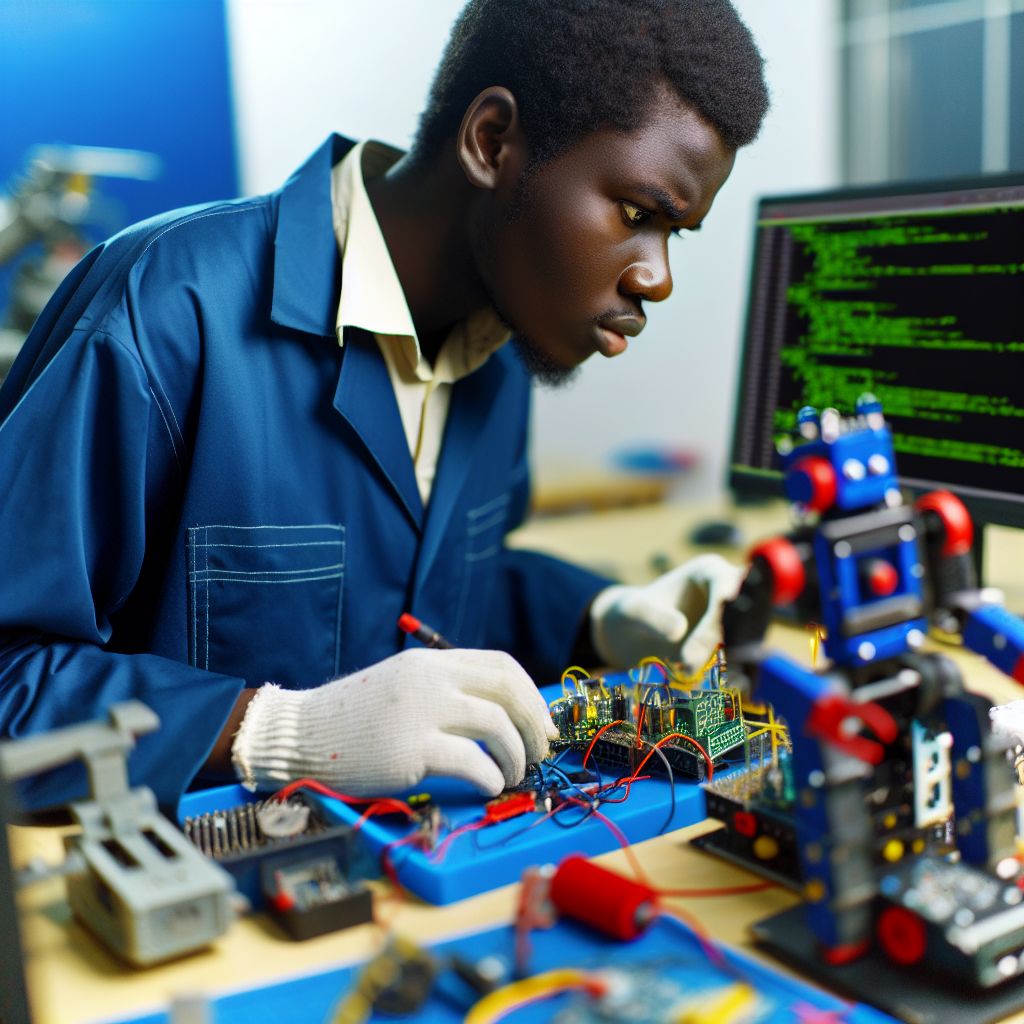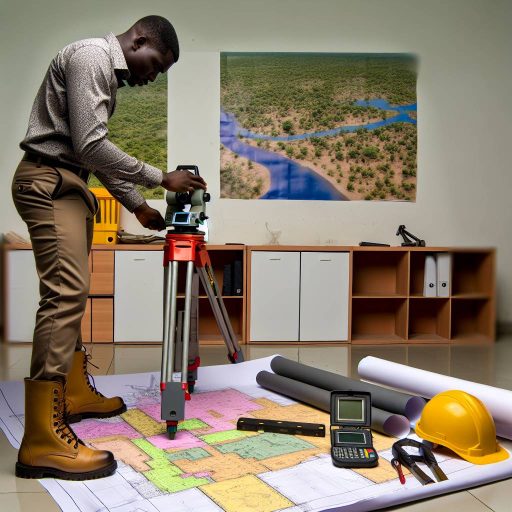Introduction
Mechatronics engineering combines mechanical, electrical, and computer engineering to design and create intelligent systems.
In Nigeria, mechatronics engineers play a crucial role in driving technological advancements.
The importance of mechatronics engineers in Nigeria
Mechatronics engineers are responsible for developing innovative solutions in various industries, such as manufacturing, automotive, and robotics.
They contribute to the growth of the economy by enhancing productivity and efficiency.
Challenges faced by mechatronics engineers in Nigeria
Despite the significant role they play, mechatronics engineers in Nigeria face numerous challenges.
One major issue is the lack of adequate infrastructure and resources to support their work.
This includes limited access to quality components, tools, and equipment, which hinders their ability to carry out projects effectively.
Challenges Facing Mechatronics Engineers in Nigeria
Lack of adequate infrastructure
One of the major challenges facing mechatronics engineers in Nigeria is the lack of adequate infrastructure.
- Limited access to tools and equipment
- High-quality tools and equipment are essential for mechatronics engineering projects.
- Without access to these resources, engineers are unable to carry out their work effectively.
- From basic hand tools to advanced machinery, the lack of infrastructure hinders project development.
Moreover, the scarcity of testing facilities and research laboratories further exacerbates the problem.
- Engineers are unable to conduct in-depth research or test their innovations without proper facilities.
- This limitation stifles creativity and innovation in the field of mechatronics engineering.
- As a result, Nigerian engineers may fall behind their global counterparts in technological advancements.
Furthermore, the inadequate infrastructure leads to a lack of hands-on experience for aspiring engineers.
- Without access to modern tools and equipment, students are unable to gain practical skills.
- This gap between theoretical knowledge and practical application hinders skill development.
- Engineers entering the workforce may struggle to adapt to real-world engineering challenges.
The limited access to tools and equipment is a significant obstacle to the development of mechatronics engineers in Nigeria.
Scarcity of Specialized Mechatronics Engineering Programs
One key issue is the scarcity of specialized mechatronics engineering programs in Nigerian universities.
- Lack of dedicated courses in mechatronics limits students’ exposure to the field.
- Most engineering programs focus on traditional disciplines like mechanical or electrical engineering.
- This narrow focus hinders the holistic development of mechatronics skills.
Impact on Training and Skill Development
The limitation in educational opportunities significantly affects the training and skill development of aspiring mechatronics engineers.
- Students interested in mechatronics have to settle for related but not exactly relevant courses.
- This compromises their foundational knowledge and practical skills necessary for mechatronics engineering.
- Without a dedicated program, students may lack exposure to advanced mechatronics concepts and technologies.
- They miss out on specialized courses that delve deep into areas like robotics, automation, and control systems.
- As a result, graduates enter the workforce with gaps in their understanding of mechatronics principles.
The scarcity of specialized mechatronics engineering programs in Nigerian universities poses a significant challenge to aspiring mechatronics engineers.
It is crucial for educational institutions and policymakers to address this gap to ensure the country has a well-trained workforce in this critical field.
Uncover the Details: Biomedical Engineering Workshops and Training in Nigeria
Inadequate funding
Funding is a major challenge faced by mechatronics engineers in Nigeria.
Without adequate financial support, research and development in this field are severely hindered.
Impact on innovation
Due to the lack of funding, mechatronics engineers struggle to access the resources needed to carry out innovative projects.
This hampers their ability to create cutting-edge technology and solutions.
Stifling growth
Without sufficient financial support, the growth of mechatronics engineering in Nigeria is significantly stunted.
Engineers are unable to invest in new technologies and advancements, limiting progress in the field.
Opportunities missed
The lack of funding means that potential breakthroughs in mechatronics engineering are missed.
Opportunities to solve crucial problems and contribute to global advancements are lost due to financial constraints.
Competitive disadvantage
Compared to countries with ample funding for research and development, Nigeria’s mechatronics engineers are at a competitive disadvantage.
They struggle to keep up with the latest trends and innovations in the field.
Call for increased funding
To address this challenge, there is a critical need for increased funding for mechatronics engineering in Nigeria.
Government support, private investments, and partnerships with international organizations can help bridge the funding gap and propel the field forward.
Gain More Insights: Land Surveying and Geoinformatics: A Career Overview
Poor Industry Collaboration
One of the major challenges facing mechatronics engineers in Nigeria is the lack of collaboration between the industry and professionals in the field.
This disconnect poses several obstacles to the growth and development of mechatronics engineering in the country.
Explore the Disconnect Between Mechatronics Engineers and Industries in Nigeria
Many mechatronics engineers in Nigeria often find themselves disconnected from the industries where their skills and expertise are needed.
This disconnect can be attributed to various factors such as lack of networking opportunities, limited industry awareness about mechatronics, and inadequate support for professional development.
Due to this disconnect, mechatronics engineers may struggle to find suitable job opportunities, internships, or projects that align with their expertise.
This can lead to frustration and underutilization of their skills, ultimately hindering their career growth and potential impact in the industry.
How This Lack of Collaboration Hinders Opportunities for Job Placements, Internships, and Skill Development
One of the key implications of poor industry collaboration is the limited access to job placements for mechatronics engineers in Nigeria.
Without strong connections and partnerships with industries, professionals in the field may struggle to secure employment opportunities that match their qualifications and interests.
This can result in unemployment or underemployment, leading to wasted talent and resources.
Similarly, the lack of collaboration between mechatronics engineers and industries hinders opportunities for internships and practical experience.
Internships play a crucial role in helping engineering students and recent graduates gain hands-on experience, develop key skills, and network with industry professionals.
Transform Your Career with Expert Guidance
Get personalized mentorship consulting that’s tailored to your unique path. Our expert advice is actionable and exclusive.
Get StartedWithout industry support and engagement, mechatronics engineers may miss out on valuable learning opportunities that could enhance their career prospects.
Furthermore, the absence of collaboration between the industry and mechatronics engineers in Nigeria can impede skill development and innovation in the field.
Industry partnerships are essential for staying abreast of the latest technological advancements, industry trends, and best practices.
Without active engagement with industries, mechatronics engineers may struggle to stay competitive, relevant, and innovative in their work.
Addressing the Collaboration Gap for Enhanced Opportunities
Poor industry collaboration presents significant challenges for mechatronics engineers in Nigeria.
Addressing this issue requires concerted efforts from both professionals in the field and industry stakeholders to bridge the gap.
By fostering partnerships and creating opportunities for job placements, internships, and skill development, the field can thrive.
Enhanced collaboration between mechatronics engineers and industries can help professionals reach their full potential.
Nigeria can position itself as a hub for mechatronics innovation and excellence.
Learn More: Internship Opportunities for Mechatronics Students

One Major Challenge Facing Mechatronics Engineers in Nigeria
The unfavorable government policies pose a significant challenge for mechatronics engineers.
Inconsistent Regulations and Policies
The lack of consistency in regulations and policies in Nigeria presents a significant challenge for mechatronics engineers.
Impact on Certifications
Engineers face difficulties in obtaining the required certifications due to changing regulations.
This leads to delays in their professional growth.
Licensing Issues
Inconsistent government policies make it challenging for engineers to secure licenses for their projects.
This hinders their ability to work effectively.
Project Approvals Obstacles
Engineers often face obstacles in gaining project approvals due to ever-changing regulations.
This leads to project delays and increased costs.
Hurdles for Mechatronics Engineers
These unfavorable government policies create obstacles for mechatronics engineers in various aspects of their work.
Talent Development
The lack of clear regulations affects talent development in the field.
Engineers struggle to meet licensing and certification requirements.
Technology Adoption
Changing policies make it challenging for engineers to adopt new technologies.
They find it hard to stay up-to-date with industry standards.
Business Operations
Inconsistent regulations impact the smooth running of engineering businesses.
This leads to delays in project completion and increased costs.
Uncover the Details: Practical Skills Needed for Automobile Engineering in Nigeria
Challenges Faced by Mechatronics Engineers in Nigeria
Mechatronics engineers in Nigeria face several challenges.
These include inadequate infrastructure and limited access to modern technology.
These obstacles hinder their ability to innovate and compete globally.
It is crucial for the government and private sector to provide proactive solutions.
Support systems must include investment in research and development.
Improving education and training programs is also essential.
A conducive environment for technological advancements needs to be created.
By addressing these challenges, we can empower mechatronics engineers in Nigeria.
They can then overcome barriers and thrive in their field.
Additional Resources
Emmanuel Peter – Undergraduate Research Assistant – Applied …
Toyibat Adele – Lagos, Lagos State, Nigeria | Professional Profile …




